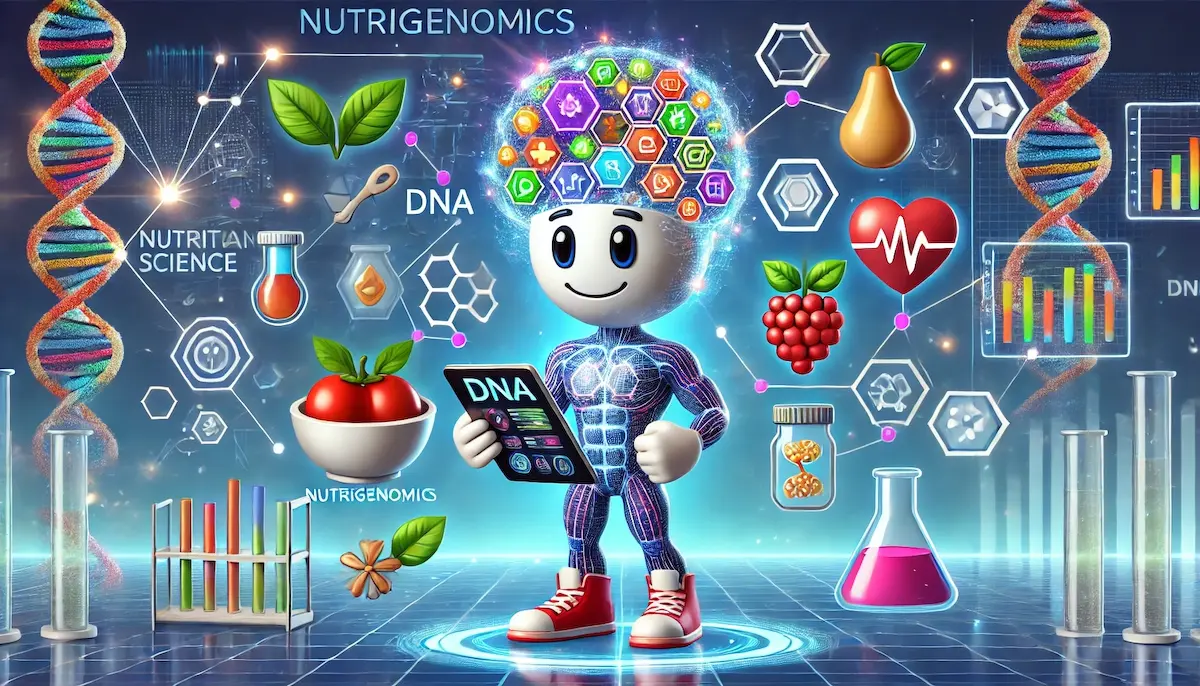Nutrigenomics is the study of the relationship between an individual’s genetic makeup and their response to diet and nutrition. This emerging field combines nutrition, genetics, and molecular biology to understand how specific nutrients affect gene expression and how genetic variations influence an individual’s nutritional needs and health outcomes. Nutrigenomics aims to personalize nutrition strategies to optimize health, prevent disease, and improve overall well-being.
The Evolution of Nutrigenomics
Nutrigenomics began to take shape in the late 20th century, following advances in genetic research and the completion of the Human Genome Project in 2003. The realization that genes play a significant role in how the body processes nutrients and responds to diet led to the development of nutrigenomics as a distinct field. Early research focused on identifying genetic variants, known as single nucleotide polymorphisms (SNPs), that affect metabolism, nutrient absorption, and the risk of diet-related diseases such as obesity, diabetes, and cardiovascular disease.
As DNA sequencing technologies became more accessible and affordable, nutrigenomics research expanded, enabling large-scale studies that link specific genetic variants with dietary responses in diverse populations. Today, nutrigenomics is a rapidly growing field with significant implications for personalized nutrition and public health.
Key Areas of Nutrigenomics
Gene-Nutrient Interactions
One of the central focuses of nutrigenomics is understanding gene-nutrient interactions—how specific nutrients influence gene expression and how genetic variations affect an individual’s response to these nutrients. For example, the way your body metabolizes fats, carbohydrates, and vitamins can be influenced by your genetic makeup, affecting your risk of developing conditions like obesity, diabetes, or heart disease.
Researchers study how certain nutrients can activate or silence genes through mechanisms such as DNA methylation, histone modification, and microRNA regulation. For instance, certain dietary components like omega-3 fatty acids or polyphenols found in fruits and vegetables can have anti-inflammatory effects by modulating gene expression, potentially reducing the risk of chronic diseases.
Personalized Nutrition
Nutrigenomics is paving the way for personalized nutrition, where dietary recommendations are tailored to an individual’s genetic profile. This approach goes beyond general dietary guidelines, offering customized advice that considers an individual’s unique genetic makeup, lifestyle, and health goals. Personalized nutrition can help individuals optimize their diets to achieve better health outcomes, manage weight, and prevent chronic diseases.
For example, a person with a genetic variant that affects their ability to metabolize caffeine may be advised to limit their coffee intake to avoid adverse effects like increased blood pressure or insomnia. Similarly, someone with a genetic predisposition to lactose intolerance might benefit from avoiding dairy products or choosing lactose-free alternatives.
Nutrigenomics and Disease Prevention
Nutrigenomics has significant implications for disease prevention, particularly for conditions where diet plays a key role, such as obesity, type 2 diabetes, cardiovascular disease, and certain cancers. By identifying genetic risk factors for these diseases, nutrigenomics allows for early interventions through personalized dietary strategies.
For instance, individuals with a genetic predisposition to high cholesterol may be advised to follow a diet low in saturated fats and cholesterol to reduce their risk of developing heart disease. Similarly, those with a higher genetic risk for type 2 diabetes might benefit from a diet that emphasizes whole grains, fiber, and low glycemic index foods to manage blood sugar levels.
The Microbiome and Nutrigenomics
The gut microbiome—the community of trillions of microorganisms living in the digestive tract—plays a crucial role in how nutrients are processed and how diet affects health. Nutrigenomics research increasingly focuses on the interaction between the gut microbiome and genetics, exploring how these factors together influence individual responses to diet.
For example, the composition of the gut microbiome can affect how well certain nutrients are absorbed and metabolized. Nutrigenomics aims to understand these complex interactions and develop personalized dietary recommendations that optimize gut health, enhance nutrient absorption, and reduce the risk of disease.
The Impact of Nutrigenomics
Nutrigenomics has the potential to revolutionize nutrition and public health by offering more precise, individualized dietary recommendations. This field is leading to a deeper understanding of how diet influences health at the genetic level and how personalized nutrition can be used to prevent and manage chronic diseases.
Improving Health Outcomes
By tailoring dietary recommendations to an individual’s genetic profile, nutrigenomics can help improve health outcomes and quality of life. Personalized nutrition can lead to more effective weight management, better control of blood sugar levels, reduced inflammation, and lower risk of developing diet-related diseases.
Enhancing Public Health Strategies
Nutrigenomics also has implications for public health, as it can inform more targeted nutritional interventions and public health campaigns. By identifying genetic risk factors within populations, health authorities can develop more effective strategies to address issues like obesity, diabetes, and cardiovascular disease. For example, nutrigenomics could help identify populations that would benefit most from specific dietary guidelines or fortification programs.
Empowering Individuals
Nutrigenomics empowers individuals to take control of their health by providing personalized dietary advice based on their unique genetic makeup. As genetic testing becomes more widely available, people can make informed decisions about their diets, lifestyle, and health management, leading to a more proactive approach to well-being.
Challenges and Future Directions
Despite its promise, nutrigenomics faces challenges such as the complexity of gene-diet interactions, the need for more extensive research, and ethical considerations related to genetic testing. Additionally, the integration of genetic data with other factors like lifestyle, environment, and microbiome composition requires sophisticated tools and approaches.
Looking ahead, advances in artificial intelligence (AI) and machine learning hold promise for analyzing the vast amounts of data generated by nutrigenomics research. These technologies can help identify patterns and predict how different individuals will respond to specific diets, further refining personalized nutrition strategies.
Nutrigenomics is a rapidly advancing field that is transforming our understanding of the relationship between diet and health. As research continues to evolve, nutrigenomics will play an increasingly important role in personalized medicine and nutrition, offering new opportunities to improve health and prevent disease through tailored dietary strategies.
Blockfine thanks you for reading and hopes you found this article helpful.
